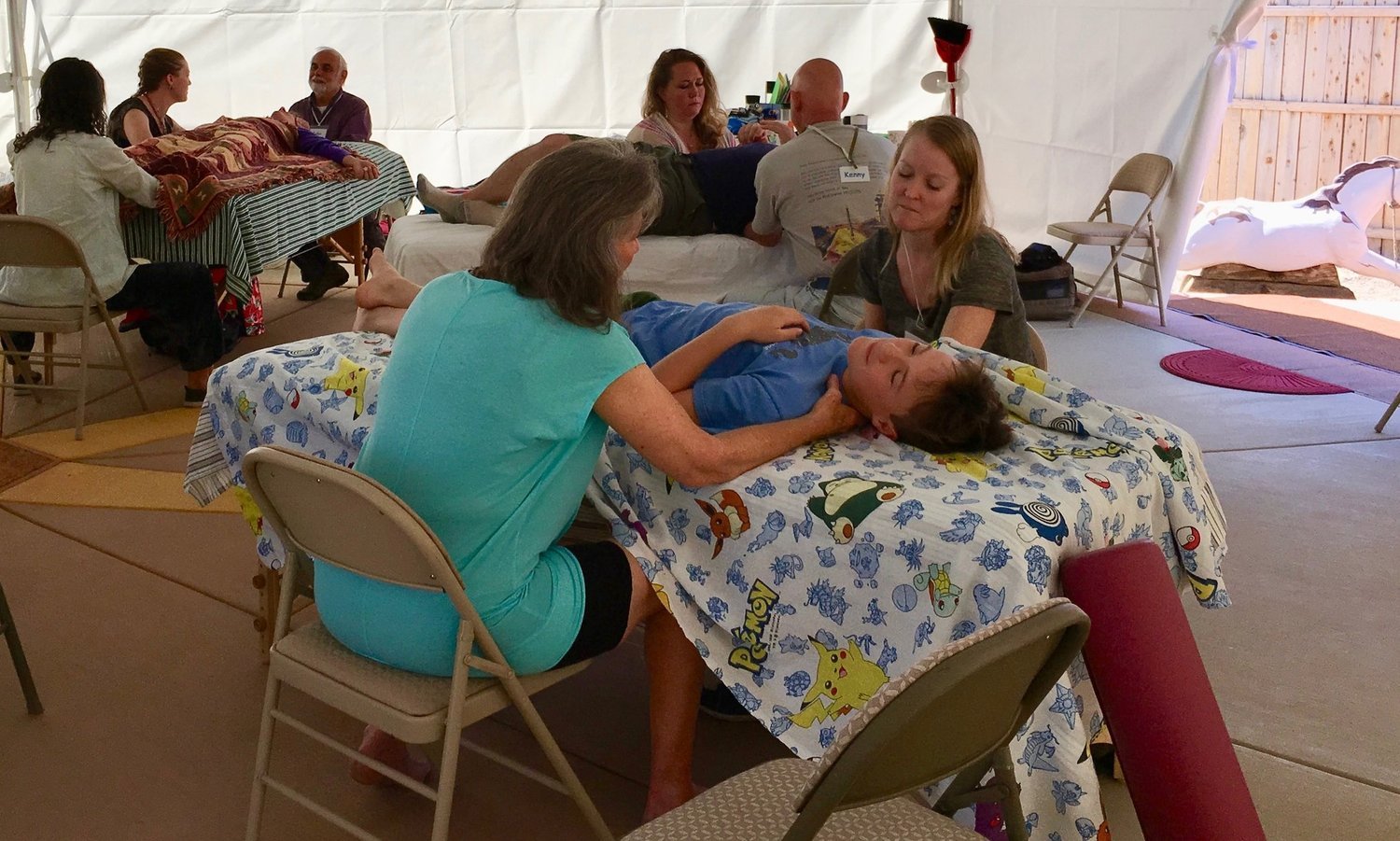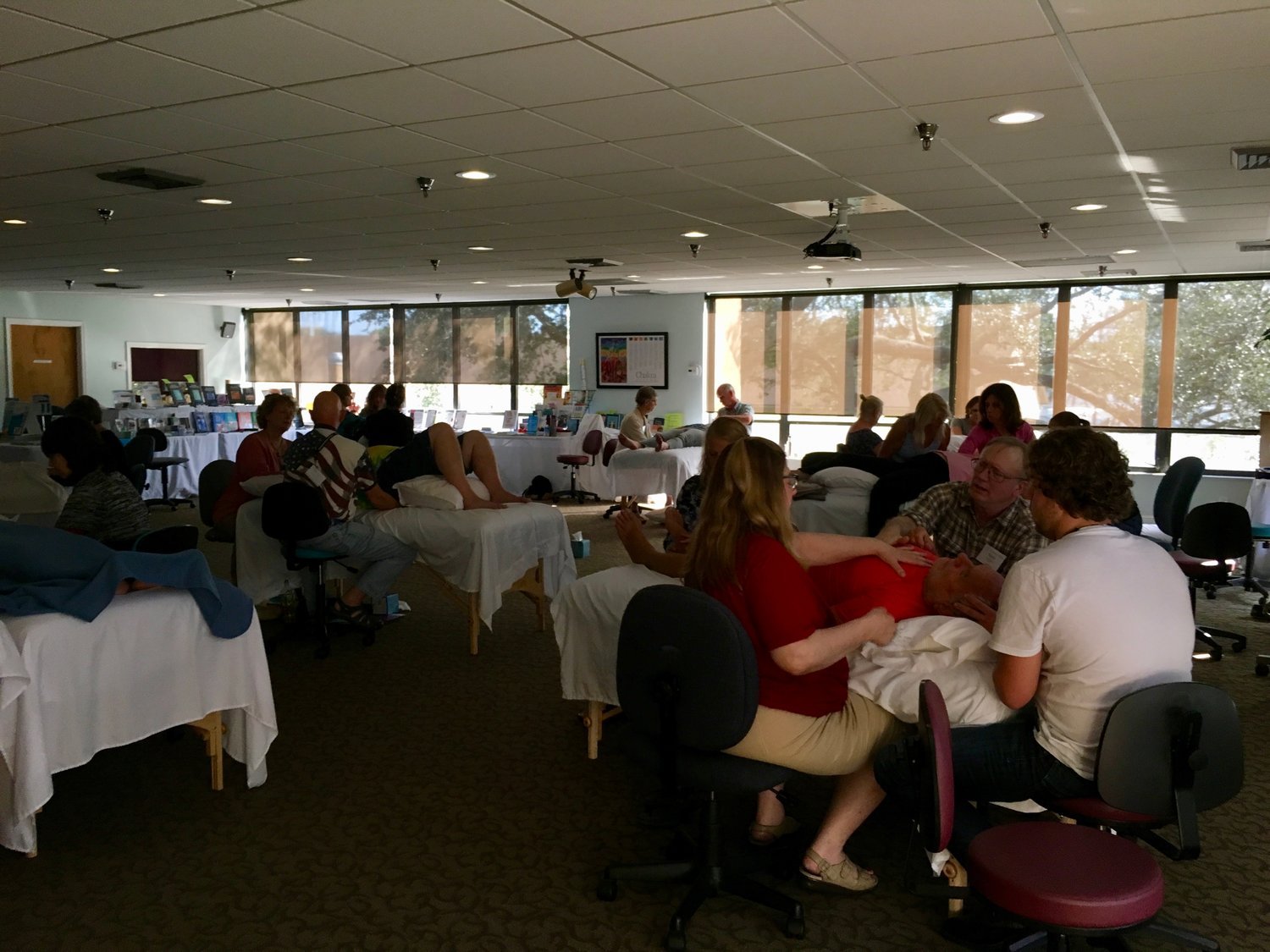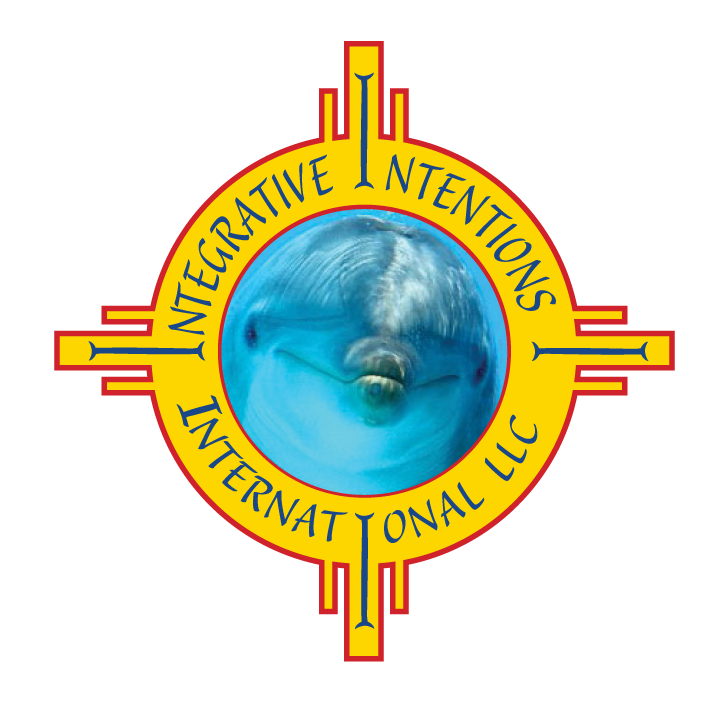
Being a therapist in one of our programs is an amazing accelerated learning experience in which you develop your multi-hands CranioSacral Therapy skills. There is no charge to participate with us as a therapist. Therapists in Comprehensive Therapy Programs (CTP) receive 37 continuing education credits, and 27 continuing education credits for Dolphin Assisted CranioSacral Therapy (DACST) Programs. In order to participate as a therapist in a DACST, a prior BioAquatic course is required. Both programs fulfill the preceptorship requirements for the Upledger CST Diplomate certification.
As therapists in these programs, we all share basic principles and practices, implicitly and explicitly developed by Dr. John Upledger, as taught through the Upledger Institute and embodied by CTPs. Please take a moment to familiarize yourself with our Mission, Principles & Practices.
All therapists must register through Integrative Intentions International. You will receive confirmation upon registration, and a letter prior to the program with more specific information.
“Great class- lots of good CST techniques to practice & explore in the water. Loved the variety of locations to practice- ocean, pool, dolphins! Great opportunity to do deep work and receive training to become support/primary therapist in DACST programs. Would love to take class again.”
-J Minor
Explore Our BioAquatic Classes
All BioAquatic™ Exploration classes have the same basic format and are designed to complement the Upledger core curriculum. The introductory BioAquatics Exploration classes are open to therapists with varying levels of CST training. The Shared Connections BioAquatics Exploration class (BAER) is open to therapists with CST training and people with whom they share a relationship.
The BioAquatics™ Exploration classes relate to the Dolphin Assisted CranioSacral Therapy (DACST) program. In order to be a support therapist in a DACST program, at least one prior BioAquatic Exploration class (BAEC {pre-requisite CST1}, BAES {pre-req SER1}, or BAEA {pre-req ADV1) is required for all therapists. The BioAquatics: Advanced Dolphin Assisted CST (BADA) class is recommended for all therapists and is required for DACST Primary Therapists.


Are you ready to join us?
In every program there are three types of therapists: Primary, Support and Adjunct. Requirements for each type are detailed by program.
Therapists are an integral aspect of all programs. You will be able to work with many other talented and gifted therapists, facilitating the healing the clients. It is amazing how much we all learn from one another!
There will be guidance for Support Therapists, as well as optional evening time to spend with other therapists, sharing treatments and skills, having personal rest and relaxation time and enjoying the unique opportunities provided by the specific facility and location of the CTP and the attending community of therapists.
To register as a support therapist, please email integrativeintentions@gmail.com
First time support therapists are encouraged to enroll in our individually designed MultiHands Therapist Mentoring Program.
Dolphin Assisted Therapy Requirements
-
∙ Must be UI Diplomate certified with previous experience in BioAquatics classes and Dolphin Assisted Therapy programs as a Support therapist
∙ Lead and coordinate the daily therapy sessions with the team of Support and Adjunct Therapists
∙ Mentor Support therapists
∙ Bring unique personality, skills and intentions for healing
∙ Chart all sessions with the help of Support Therapists
∙Create and maintain a safe therapeutic space for the client and therapy team
-
∙ Meet all of the requirements of a CTP Support Therapist
∙ Completion of a BioAquatics Exploration Class
∙ Have acquired skills taught in the Upledger curriculum
∙ Bring their unique personality, skills and intentions for healing
-
∙ Approved by Therapy Program Coordinator
∙ Meet all of the requirements of a Primary Therapist
∙ Have demonstrated proficiency in their respective field of expertise
∙ Bring a specific complimentary modality to the program
∙ Able to integrate their modality with the Principles & Practices of Upledger CST and SER
Comprehensive Therapy Requirements
-
∙ Must be Diplomate Certified through the Upledger Institute
∙ Participate in at least one prior Comprehensive Therapy Program as a Support Therapist
∙ Demonstrate the ability to mentor Support Therapists and facilitate their contributions to the Comprehensive Therapy Program
∙ Demonstrate the ability to create and maintain a safe and efficient therapeutic space for the client and therapy team
∙ Open to ongoing peer assessment, review and support
∙ Able to integrate individual talents and skills with CranioSacral Therapy
∙ Able to lead and coordinate the daily therapy sessions with the team of Support Therapists
∙ Responsible for charting the sessions and essential communications related to the client
-
∙ Have completed a minimum of SERI with the Upledger Institute
∙ Be cognizant of the basic Principles & Practice of Upledger CST and SER
∙ Have the capacity to remain neutral in the therapy program
∙ Participate fully as an essential element of the therapy team within the client-centered CTP
∙ Accept direction from Primary Therapists
-
∙ Be approved by the Therapy Program Coordinator
∙ Meet all of the requirements of a Primary Therapist
∙ Have demonstrated proficiency in their respective field of expertise
∙ Bring a specific complimentary modality to the program
∙ Able to integrate their modality with the Principles & Practices of Upledger CST and SER
“As a CranioSacral therapist I get to see my clients on a regular basis in my office: once a week, once a month. And things change in the gradual timetable of life. But in this intensive I was able to observe what may have taken years in a maintenance program change in 5 little days! The clients’ radical vulnerability, self-realization, and healing was profoundly moving.
-Catherine Whelan
Interested in Bringing a Client?
If you are a CranioSacral therapist referring a client to a program, we invite you to accompany the client and participate in the program as their ongoing therapist. Your history, role and participation will be respected in our team approach. You may be included in sessions and the therapy program meetings.
It is our hope to bring together all the talents of the therapists for the betterment of the client. The client provides the focal point for the various modalities and how they function, are experienced, perceived and understood.
You may participate in sessions with only your client. If you meet the requirements as a Support or Primary Therapist, you may participate in other sessions.
IF YOU HAVE ANY CLIENTS WHO WOULD LIKE TO TAKE THE NEXT LEAP IN THEIR HEALING PROCESS, PLEASE LET US KNOW HOW WE CAN HELP FACILITATE.


What to Expect & Daily Schedule of Events
It is important that all therapists are present for each full day.
Therapist Introductions
The initial therapist meeting is held the evening prior to the client program and requires the attendance of all therapists. It covers introductions so that we may become acquainted with each other, our backgrounds, therapeutic modalities and intentions. Additionally, it includes information about housekeeping, accommodations, daily schedules, therapeutic roles, basic principles, the initial presentation of client information and open time for questions, concerns and comments.
Morning Meetings
Each morning we will meet as a team with the clients. The Program Coordinator will conduct these client-focused meetings. During the first meeting, brief personal introductions to the clients will include your name, therapeutic background, and designated modalities you will be providing in the program. This time is intended for listening to clients.
Subsequent morning meetings provide time and space for the clients to let us know what they are experiencing. This is an opportunity for them to ask questions, make requests, etc. Questions and feedback by the Primary Therapist, from the previous day’s treatments, will be moderated by the Therapy Program Coordinator. It is important to take more time listening to the client than commenting.
Questions by the Primary Therapist and/or Therapy Program Coordinator help support the client in their process. At times, it is helpful to describe our intentions in the therapeutic process, i.e. melding, accessing their body's wisdom, following their process or checking their significance detector. Please refrain from giving advice and explanations about their therapy.
Therapeutic Boundaries
Therapeutic boundaries and respect for the client is required. Since we will likely be with the clients during meals and may have frequent interactions with them outside the designated therapeutic sessions, it is important that we do not initiate the client in therapeutic activities on their own time and that we realize our personal interactions with them may likely be perceived as part of the program. We may affect their attitudes and relationships to the therapeutic process. If they seek advice and feedback outside the therapeutic session, please ask them to bring their questions to group discussion or reserve them for their next therapeutic session.
End of Day Meeting
At the end of the day, the Primary Therapists will meet with their Support Therapists to review and chart the sessions. The dynamics of the treatment group may also be reviewed and assessed (the Primary Therapist decides what is important to bring to the meeting). This is a time to review and reflect on the day.
The therapy day ends with a therapy community meeting. The Primary Therapist from each treatment group will relay to the therapeutic community the most significant aspects of the day’s therapy. We are all here to share and learn from each other and provide an opportunity for the Support Therapists to ask questions and receive additional support from the team as a whole.
Note: We ask all discussions to be as clear and concise as possible, as our time is limited. We ask that issues, observations and any compelling perceptions and experiences be brought to the group and team meetings.
Each therapy community meeting includes time for each member to comment or bring up anything that needs to be expressed, acknowledged or addressed so that we may continue to work well together. Personal issues between individual participants need to be addressed outside the large group meeting. The essence of this therapy is the therapy itself, not what we have to say about it later. These meetings are designed to help us more richly engage the client-centered therapeutic process.
After the meeting you are free to do as you please. The therapy room for the Dolphin Assisted CranioSacral Therapy programs is not open in the evenings.
Closure meeting
On the last day of the program, we will end with a closure meeting from 3:30 pm to 4:30 pm for both therapists and clients.

